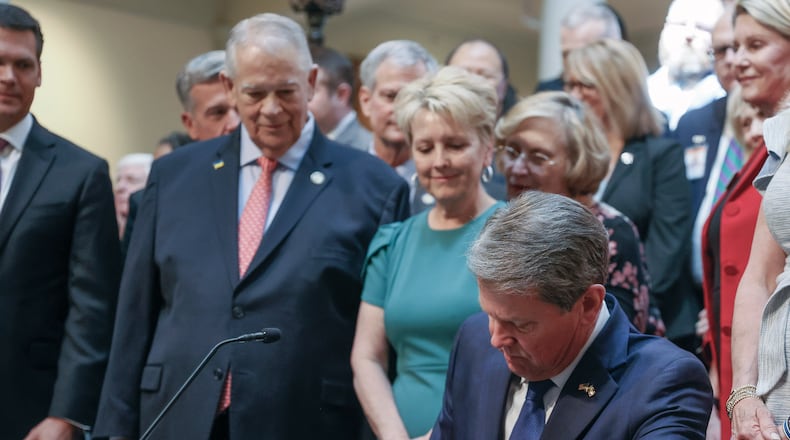Less than a week after the General Assembly approved the legislation, Gov. Brian Kemp signed a bill that aims to increase Georgians’ access to mental health and substance abuse care.
Flanked by a bipartisan group of lawmakers, advocates and several agency heads, Kemp said he and his wife have talked about the need for the legislation as they’ve traveled the state and seen the toll the coronavirus pandemic has taken on Georgians.
“Today we take the next step, a monumental step toward a Georgia where every person receives the help they need to fight and overcome whatever personal problem they may face,” Kemp said. “Today we make sure they do not fight alone.”
After weeks of meetings, revisions and compromises, the Legislature last week unanimously approved House Bill 1013. Under the new law, set to go into effect July 1, the state would enforce a federal law that requires “parity” in health coverage, forgive student loans for mental health providers who work in underserved areas of the state and take other steps to improve care.
The issue was a priority of House Speaker David Ralston, a Blue Ridge Republican who called it one of the most important bills lawmakers would vote on in their careers.
“Today we celebrate a triumph of hope in Georgia,” Ralston said before the governor signed the legislation. “It is not the end, it is the end of the beginning. There is still work to be done. This game-changing bill we are about to sign into law will mean a new day of hope and a future bright with possibilities for almost every family in Georgia.”
Georgia ranks low nationally on most measurements of mental health treatment and high in the percentage of residents who face challenges, according to a 2021 report by Mental Health America, a century-old nonprofit advocacy group. It put Georgia last for the number of mental health professionals per capita. The American Academy of Child and Adolescent Psychiatry says Georgia has only eight psychiatrists per 100,000 children; the academy suggests a better ratio is 47 per 100,000.
Passage of the bill was delayed by concerns from conservative groups and voters who said it would protect pedophiles from prosecution. They said the bill would require private insurance companies to cover treatments that go against the religious beliefs held by business owners. Bill sponsors denied the legislation did those things, but they still made changes.
As passed, the bill would require all insurance companies who offer mental health coverage to cover it the same way physical health is covered. HB 1013 seeks to increase the number of mental health professionals in Georgia and improve mental health data and transparency.
The federal government in 2008 enacted a law that aimed to require parity — meaning insurance companies were to cover mental health care the same way they do for physical health care. Data has not been collected in Georgia to determine whether that is happening, but anecdotal evidence has shown it is not.
Public health insurers, such as Medicare and Medicaid, and private insurers will have to file reports on parity to the commissioners of the Department of Public Health and Department of Insurance, respectively. It also empowers the insurance and public health commissioners to enforce the 2008 federal law.
State agencies would have to create grant programs for outpatient treatment and accountability courts that would serve mental health patients and those with substance abuse issues.
The measure is the result of recommendations from the Georgia Behavioral Health Reform and Innovation Commission, which developed more than 50 suggestions to change Georgia’s laws.
While Ralston said the legislation was the first step toward improving access to mental health care in Georgia, it still was a day to celebrate.
“HB 1013 will lift this state out of the basement on mental health care,” he said.
About the Author
Keep Reading
The Latest
Featured



